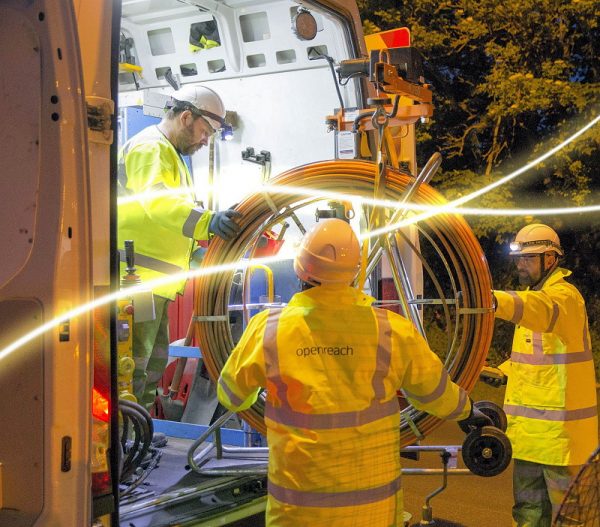Openreach Expands FTTP Broadband Discount for UK ISPs UPDATE

At the end of last year Openreach (BT) introduced a new wholesale discount on their Fibre-to-the-Premises (FTTP) service (here), which encouraged ISPs to build stronger take-up in return for reductions on service rental and connection fees. The good news is that this has now been expanded and improved.
Aside from gaining some better discounts, the scope of the offer has also been extended to include all UK premises under the operator’s “Fibre First” towns and cities program that are declared as Ready for Service (RfS) between 1st April 2020 and 31st March 2021. The amended offer will start on 1st September 2020 and is open to participation until 31st December 2020.
The amended offer replaces the existing special offer and any broadband ISPs that signed up to the original offer will be invited to sign an amendment agreement to upgrade their terms to reflect this amended offer. The overall duration of the offer remains unchanged, with rental discounts available until September 2022, followed by CPI (inflation) based price increases.
Advertisement
Openreach Statement
To be eligible for discounts [ISPs] must commit to achieving a target of FTTP new provides as a percentage of total new provides a [ISP] wish to connect to the Openreach network in the relevant footprint. Up to 30 September 2020, the FTTP target is 70%, increasing to 85% from 1 October 2020 to 31 December 2020 and 90% thereafter until the end of the offer. The offer also includes a near-miss tolerance of up to 10 percentage points from the FTTP target, where CPs get partial connection discounts and full rental discounts.
As before, all of this mixes the possibility of a free connection with reduced annual rental charges on their data-only FTTP tiers. The usual caveat applies in that these are wholesale charges and thus do not include all of the other elements that an ISP has to add, which is necessary in order to create the retail price that you’ll ultimately have to pay (e.g. 20% VAT, profit margin, capacity, service / network features etc.).
| Variant | From | Until | Annual Rental |
| Up to 80Mbit/s / 20Mbit/s | 01/09/2020 | 30/09/2022 | 183.36 |
| Up to 115Mbit/s / 20Mbit/s | 01/09/2020 | 30/09/2022 | 195.36 |
| Up to 160Mbit/s / 30Mbit/s | 01/09/2020 | 30/09/2022 | 207.36 |
| Up to 220Mbit/s / 30Mbit/s | 01/09/2020 | 30/09/2022 | 219.36 |
| Up to 330Mbit/s / 50Mbit/s | 01/09/2020 | 30/09/2022 | 255.36 |
| Up to 550Mbit/s / 75Mbit/s | 01/09/2020 | 30/09/2022 | 255.36 |
| Up to 1000Mbit/s / 115Mbit/s | 01/09/2020 | 30/09/2022 | 291.36 |
Just for comparison, Openreach’s 1000Mbps (115Mbps upload) tier normally attracts an annual rental of £375.36 +vat (£31.28 per month). Likewise, the operator also still seems to be encouraging adoption of 550Mbps instead of 330Mbps, hence the use of identical pricing levels. The new offer also includes a longer list of additional benefits than before.
Additional Benefits
* A Step Minimum FTTP threshold where CPs [ISPs] would be eligible for full rentals discounts and partial connection discounts. The Step Minimum FTTP Threshold will be 60% up to 30 September 2020, 75% from 1 October 2020 to 31 December 2020 and 80% thereafter until the end of the offer. If CPs achieve the Step Minimum FTTP Threshold, the following will apply:
For NTN connections, £10 discount reduction for every one percentage point downwards deviation from minimum FTTP threshold or list price, whichever is lowest.
For Non-NTN connections 50% of list price less £5 reduction in discount for every one percentage point downwards deviation from Minimum FTTP Threshold, or list price, whichever is lowest.
* CPs will be eligible for free bandwidth modification when upgrading to higher speeds, until 30 September 2022.
* CPs will be eligible for free bandwidth modification when downgrading to Up to 115Mbit/s / 20Mbit/s or higher speed, within six months of initial connection for circuits connected on Up to 220Mbit/s / 30Mbit/s, Up to 330Mbit/s / 50Mbit/s or Up to 550Mbit/s / 75Mbit/s speeds between 1 September 2020 and 31 December 2020, or within six months of a bandwidth modify upgrade.
* Between 1 September 2020 and 31 December 2020, if CPs connect or bandwidth modify upgrade on to Up to 220Mbit/s / 30Mbit/s, Up to 330Mbit/s / 50Mbit/s or Up to 550Mbit/s / 75Mbit/s speeds then they would benefit from a reduced rental price of £16.28 per month for three months from the date of connection or bandwidth modification.
CPs participating in the combined Primary and Secondary Offer Areas, will be able to use FTTP volumes to count towards their UF Target in The GEA Volume Offer and the Combined Primary and Secondary Offer Area will count towards the Ultrafast Rollout Plan in the GEA Volume Offer. Openreach will not increase the Communications Provider’s Ultrafast targets in the GEA Volume Offer if the inclusion of the Combined Areas in the Ultrafast Rollout Plan results in an Ultrafast Overbuild.
UPDATE 2:24pm
Openreach has given us a comment.
Advertisement
Katie Milligan, MD for Customer Commercial and Propositions, said:
“Our full fibre broadband network already covers more than 3 million premises in the UK. In a post-Covid era, ultrafast and reliable broadband has become ever more important to ensure family and friends can remain connected. So, we’re keen to upgrade customers as quickly as possible to this new full fibre platform and stop selling copper-based services over time.
We’ve spent time listening to the needs of our customers and have taken this insight to develop this extension deal which offers strong financial terms and ultimately the best connectivity and service with the widest possible coverage throughout the UK.”
Mark is a professional technology writer, IT consultant and computer engineer from Dorset (England), he also founded ISPreview in 1999 and enjoys analysing the latest telecoms and broadband developments. Find me on X (Twitter), Mastodon, Facebook, BlueSky, Threads.net and Linkedin.
« G.Network Brings FTTP Broadband to Howard de Walden Estate






















































This good news as it encourages ISPs to migrate people over to FTTP as there are more £££ in it for the ISP.
I can see quite a few ISPs doing an effective stop sell of ADSL/FTTC/GFast where FTTP is available.
I can also see the migration rates being high – hope OR have enough bods to connect up the last drops….
Frankly I think that if FTTP is available they should just switch everybody in the area, even if it is (at-first) to the lowest speed package (price match)
Openreach should be allowed to do a stop/sell for all new connections where FTTP is available, which should includes customer changes and migrations.
May I completely demur: having very nearly died because i could not get to the telephone I put a very high value on it working.
POTS has an independent power supply, if that has failed there is no dialling tone so it will work if there is a local power failure and if there is no dialling tone it is obvious and in an emergency there is no need to waste any time before trying something else
Apart from voice for 999, the line was installed when ADSL first became available and is quite improbably consistent and reliable.
Though I am an extensive internet user I can do everything I need fine with 12 Megs to which it has improved down the years.
(In July 2007 in central London, when there were several terroist bombs on Transport for London, the mobile phone networks were overwhelmed and ceased to function but the standard landlines worked fine.)
We are nearing completion of an Openreach Community Fibre project in Colchester which is not yet a Fibre First town. Will this pricing strategy also apply to ISP’s delivering new FTTP connections for CFP projects within this time frame but outside of Fibre First areas?
The documents linked from the article are clear that it’s specifically for premises in the Fibre First towns and cities footprint that are ready for service by March 2021.
You might get lucky if Colchester is included in the next Fibre First announcement. That probably became a bit more likely when vxfibre announced their plans to build FTTP to 25,000 premises. It stills feels unlikely that openreach would classify the CFP area as being within the Fibre First footprint though, at least until other nearby properties have gone live through that build programme.
Would be good if they went beyond 80/20 for FTTC, I know my line is capable of more.
But is your VDSL modem capable of more? Many are limited to 100 Mbps
I mean, that was kind of the whole point of gfast, but it’s clear the general consensus was to concentrate on FTTP instead